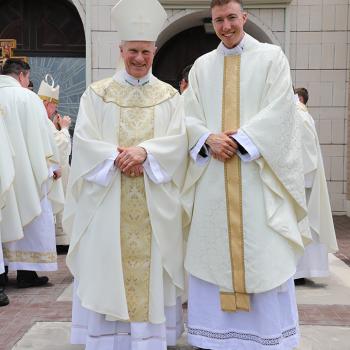The portly prophet G.K. Chesterton once observed that he knew the Catholic Church was for him because when he went into to an Anglican or a Methodist church his umbrella was still at the back where he left it, but when he went to a Catholic church it had been stolen.
Oscar Wilde made a similar point when he quipped, "The Catholic Church is for saints and sinners, but for respectable people, the Church of England will do."
The whole problem with the Protestant Revolution is that Christians pulled out of the Catholic Church looking for a perfect church, and they've been pulling out of their own churches ever since—still looking to either find or create a perfect church, and that church is St. Utopia's.
Here's what St. Utopia's looks like: it has a vibrant, good-looking pastor who, like Mary Poppins, is practically perfect in every way. They have a terrific youth ministry; worship is either a sublime liturgy or a terrifically relevant blend of hip-hop, youth culture, and Hollywood. They minister to the poor; they've got a wonderful outreach program. They have mission trips to the developing world. The "welcome team" makes everyone feel at home with gracious grins and soothing smiles.
It's a growing church. The fellowship and the friendship seem so real—so caring—so loving. They've gathered lots of people who have shopped around for the perfect church and settled at St. Utopia's. It's just what church should be right?
Maybe. Maybe not. I hate to pop balloons, but in my experience of over fifty years as a Christian, when it comes to churches and church leaders, things are almost always not what they seem. And the more perfect they seem, the greater the illusion.
Americans, in particular, are suckers for the snappy, snazzy world of "successful" churches. We're taken in by the slick shucksters of religion who create that wonderful feel-good church that is very seductive. It's part of our Protestant culture. One of the pastimes of Protestant America is to create new religions. We're always trying to improve the product and come up with one that is the latest, the best, and the most wonderful.
As a result our churches have become ever more artificial, shallow, and distant from the gospel of Jesus Christ.
Here's what gives me the creeps about some of these churches: they're covering up all the dirt. They're colluding together to create this dream church of wonderful people, but underneath it's not so nice. Just try scratching to see what's beneath the surface. They'll bite back. They'll rally around to protect the dream, and you'll be out on your ear in record time.
St. Utopia's, like all utopias, is a dystopia. It is dysfunctional, and here's how that shows: that "practically perfect in every way" pastor? He's getting a lot of love from everyone, and that feels very good.
Why do they give him so much love? Because he's making them feel good about themselves. Usually that means he's making them feel that they are better than everybody else. Maybe they are better because they have fine worship and a beautiful church. Maybe they are better because they have hip-hop worship and work with the poor. Maybe they are better because they do more mission work than others. Whatever it is, the pastor makes them feel good and they love him back for it.
What you get is a mutual admiration society. It's a win-win. The people keep the pastor on the pedestal and so they get the plaster saint they want. He gets the love and adoration he wants and needs. He loves them and they love him, and the spiral gets bigger and bigger. More and more folks are drawn into the net of "love" and the "fellowship" is enlarged and the money keeps rolling in.
But eventually the bubble of St. Utopia's bursts. It turns out the pastor is not what he seemed, or some scandal erupts. People rush to put out the flames, but then all the dark, pent up feelings emerge. The higher they flew, the harder they fall. The bigger the bubble, the bigger the bang when it bursts.
The scenario I have described is the typical dynamic of cults and sects. It's how they work. The group psychology is weird and sick and yet it abounds in many churches and organizations, both Protestant and Catholic.
Why does it exist? Because we have an addiction to the quick fix, the instant solution, and the magic wand. It is easier to join St. Utopia's than to climb the long, lonely road up the mountain to heaven. It is easier to join St. Utopia's for an instant nirvana fix once a week than it is to achieve holiness. It is easier to trot along to St. Utopia's than it is to face our inner demons and the faults and frailties of others. It's easier to believe in the Disneyland happiness and harmony of St. Utopia's than to get on with the dirty work of living the life of sacrifice, forgiveness, sanctity, and faith.
The bottom line is that if a church or fellowship seems too good to be true . . . it's too good to be true. It's fake, and the sooner you realize it the happier you'll be.





